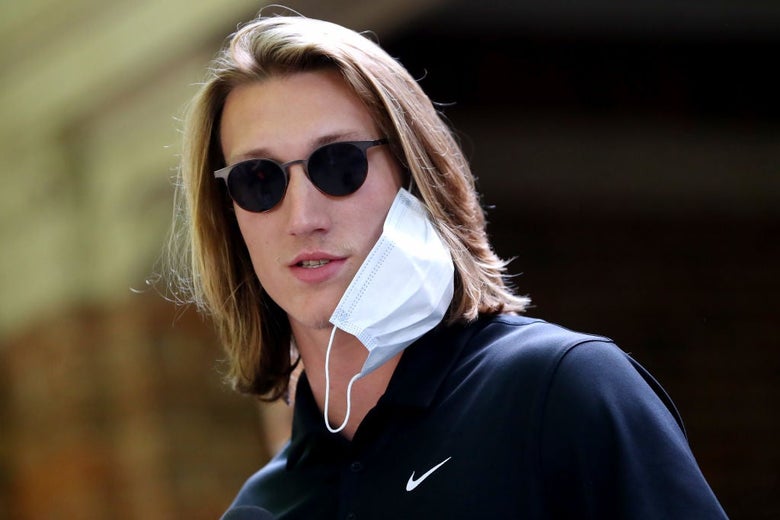
College football is in a state of chaos. On Sunday, press reports indicated that the university presidents who oversee big-money NCAA programs were preparing to cancel the fall season-or at least postpone it, in a hopeful manner, until spring-over concerns about COVID-19. On Sunday night, team leaders from a number of those programs, including several players who have been campaigning for college athletes to have greater labor rights, called for the season to be played as planned. On Monday, a number of Republican politicians joined in that call, culminating in this:
The student-athletes have been working too hard for their season to be cancelled. #WeWantToPlay https://t.co/lI3CCKZ4ID
- Donald J. Trump (@realDonaldTrump) August 10, 2020
WTF? Has Team MAGA decided it now supports a predominately Black labor movement?
Not really, and to understand why, it helps to separate the interested parties into three groups-the schools, the players, and the politicians-and examine their incentives separately.
1. The schools. Big-time football programs make big-time money: Ohio State's athletic department, for example, made $210 million in revenue in the 2018-19 fiscal year, most of that from football. None of that revenue goes directly to players; instead, it's used to fund so-called non-revenue sports and to pay enormous coaching and administrative salaries that are bloated and unnecessary precisely because the players don't get a cut. If there's no football season, there's no money to keep these athletic departments afloat-which is why, until a few days ago, the leaders of the so-called Power 5 athletic conferences were all pushing for a season, to the point of sanctioning practices and rolling out purportedly safer schedules involving exclusively regional games. (Michigan and Washington, for example, had canceled the game they were supposed to play on Sept. 5.)
But the testing and safety protocols that individual conferences put in place (or claimed to be putting in place) over the summer weren't enough to prevent a number of programs from having coronavirus outbreaks while players were participating in (relatively) low-intensity, non-contact conditioning. With teams on the verge of starting full-contact practices, incidents like an Indiana offensive lineman's emergency room trip drew attention to the potentially disastrous short- and long-term safety and liability effects of playing through a pandemic. The result: a kind of stampede toward cancellation over the course of a few days, culminating in Sunday's reports that the season would be called off.
2. The players. There are literally thousands of Division I football players, who have varying personal incentives and attitudes toward risk. But in the graphic above, you can see a set of principles that a wide-ranging group of athletes, from backups to Heisman contenders like Clemson quarterback Trevor Lawrence (whose tweet Donald Trump shared) and Ohio State quarterback Justin Fields, have agreed on. The players, as a whole, have trained all summer under pain-in-the-ass health restrictions and, more broadly, oriented their entire lives around fall Saturday competitions. Many of them aspire to play in the NFL but need more opportunities to prove themselves to pro scouts. Many also play for programs that have successfully prevented viral transmission during summer practices; a proof of concept (sort of) exists. (You can see the reasoning: You're gonna stop us from playing just because Rutgers can't get its shit together?) They want the season to happen, but only under a strictly enforced safety regime that they themselves have a say in creating and approving, and they want anyone who opts out of participating because of health concerns to be able to retain their eligibility. The language Lawrence and other players shared about launching a college players' association has the potential to revolutionize-and professionalize-the sport, in ways that Group 1 (the schools) and Group 3 (the politicians) would certainly not approve of.
3. The politicians. This one is simple. Right-wing politicians and pundits want a college football season for the same reason they've leveraged restaurants and schools into reopening: to create the impression that the United States is returning to "normal" life because the pandemic is under control, and to avoid having to backstop costly closures and cancellations with federal spending. It's an item of faith for this group that only liberal hysterics are concerned about becoming infected or killed by the coronavirus; anyone who raises such concerns is therefore an enemy, even if that person is an essentially apolitical college administrator whose concerns are largely financial. The right wing's support for players is situational, and will be disavowed as soon as the conversation turns back toward compensation.
The presidents and conference commissioners who run college football are in a pickle. Their players are asking to help them make money, but only if they're recognized as equal partners. A number of high-profile coaches-who ostensibly work for the administrators, but make much more money than they do-have made clear that, if it were up to them, the games would take place. Donald Trump has burst, Kool-Aid Man-style, into the room.
What will they do? They could recognize that players are different than "regular" students, bring them into the planning process, and try to put together COVID-safe foot-bubbles on each Power 5 campus. (It still might not work, but the subsequent cancellation would have more legitimacy.) They could hold the line and cancel everything right now, giving their increasingly autonomy-conscious players an entire semester off to keep organizing. They could split up along lines of political geography, with the West and Midwest canceling and the South trying to play, a move that could trigger defections and rebellions that end the NCAA as we know it. But what has become clear, very suddenly, is that they cannot continue to make decisions unilaterally with the expectation that the players will be too busy lifting weights, and too intimidated by cultural attitudes toward "entitled" athletes, to do anything about it.